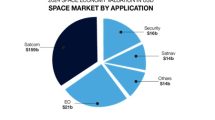 By Salem Humaid AlMarri, Director General of MBRSC
By Salem Humaid AlMarri, Director General of MBRSC
In the field of space, we never stop thinking about the next big thing. Ever since the advent of the space race, humanity has gone above and beyond their capabilities to reveal more, gain knowledge and share more about our universe, galaxies, and the cosmos in general. The recent launch of the James Webb Space Telescope is yet another milestone for humanity in our journey to understand further about the vast unknown. Adding to that, the launch has been made possible due to the unflinching partnership between the American space agency NASA, European Space Agency and the Canadian Space Agency.
Partnerships to the fore
These unifying moments of collaborations is what defines the space sector. It is not just a triumph of the scientists, engineers, and people behind this project, but an inspiration to the multitude of spacefaring nations that are aiming to contribute to the space sector. It furthers the ambition of future generations, to make a mark in the annals of scientific history.
The future of space exploration is the responsibility of multiple stakeholders. From global space agencies to the up-and-coming private sector players and even the general public – each of us has a role to play in guiding the global space journey forward. It will not only push and inspire technological innovations but will further build on the ecosystem to encourage a seamless collaboration between science and academia, large corporations and SMEs to NGOs and institutions, among others.
The UAE space journey
As a young spacefaring nation that is celebrating its golden jubilee this year, the UAE has made significant strides in space science and exploration, pushing the limits to what we can achieve in this field. From building our first satellite as early as 2007, it has taken us less than a decade and half to go from there to sending a mission to Mars – a first interplanetary mission from the Arab world. This mission has already gathered over 100 GB data about the weather and climate patterns on Mars, which have been made available to the scientific community through our data centres.
But we aren’t stopping at that. This year, we also announced the Emirates Lunar Mission to land the Rashid rover on the moon and study a never before explored region. The findings from this mission will be crucial to future space travel and creation of space suits and vehicles for interplanetary missions.
Beyond this, we are also building on our astronaut corps, and aim to establish a human settlement in Mars by the year 2117. Our projects and ambitions today are guided towards the vision of the future.
The future is collaborative
We have always believed in the power of collaboration and our scientific milestones could not have been realised without our partners. MBRSC’s latest satellite project – the MBZ-SAT, which when completed will be the most advanced satellite in the region in the field of high-resolution satellite imagery, has been pivotal in supporting the local space industry, with 90% of the mechanical structure and 50% of the electronic modules being built in the UAE. Furthermore, we have partnered with agencies and academia from around the world to collaborate on the mission.
Similarly, the second batch of the UAE Astronaut Programme is currently training with the 2021 NASA Astronaut Candidate Class, while Emirati analog astronauts are currently undertaking the UAE Analog Mission#1, as part of the Scientific International Research in Unique Terrestrial Station (SIRIUS-21), in an 8-month long project in Moscow, Russia.
MBRSC has always encouraged collaborations with the scientific community to continue to encourage scientific programmes aimed at exploring newer research activities and application possibilities in the field of STEM. Our work together with our collaborators will enable scalability, resilience and most importantly deliver unparalleled observations of space, research, and technology for the betterment of humankind.
2022 and beyond will be even better and bigger for the next frontier as the launch of the James Webb Space Telescope has signalled. Understanding the positives of the space industry, the UAE too, has as part of its diversification explored and established itself as a leader in the field in the Arab region through its space missions and programmes. As a country, we are not only celebrating the past 50 years, but also look towards a future of growth, prosperity and unity for ‘the next 50.’
 By Salem Humaid AlMarri, Director General of MBRSC
By Salem Humaid AlMarri, Director General of MBRSC












Add Comment